
(c) Bodleian Library, University of Oxford, 2009 - MS. Kafka 49, item 17v
The Arts & Humanities Research Council has awarded over one million pounds to our project entitled ‘Kafka’s Transformative Communities.’ It is a collaboration between Profs. Carolin Duttlinger (PI, Oxford), Katrin Kohl (Co-I, Oxford), Barry Murnane (Co-I, Oxford), and Lucia Ruprecht (Co-I, Free University Berlin).
Both Kafka and his protagonists are often cast as isolated entities disconnected from their surroundings. We want to challenge this image. Our project focuses on community as a central but neglected aspect of Kafka’s work.
After all, community is a constant thread in Kafka’s writings, from his earliest texts to his last story, whose artist-protagonist is defined by her relationship with the collective.
It is Kafka’s engagement with community that acts as the springboard for the project’s distinctive approach, structured around three themes.
Not surprisingly, the first theme is Community, unpacking Kafka’s depiction of collectives in light of his Jewish and Austro-Hungarian context. Worldliness is the second theme, and focuses on Kafka’s role as a world author. Not only how he’s been received in different times and places, but also his own engagement with a globalising world.
The third, Transformation theme assesses Kafka’s legacy in different art forms and media. As such, the project will fund creative partnerships with leading artists and cultural institutions. It will include a Kafka exhibition at the Weston Library (marking the centenary of Kafka’s death), a dance adaptation of ‘A Hunger Artist’, radio dramas of The Trial and America, new songs, and a new anthology of short stories inspired by Kafka.
In addition, two conferences, Kafka Transformed (2024) and Kafka in the World: Life, Death and Afterlife (2025), will connect scholars from different disciplines around the world. Travel bursaries will encourage the participation of freelance artists, Early Career Researchers and academics based in emerging economies.
These conferences are central to our aim of building a broad and inclusive research community. To that end, the project includes the launch of a new Global Kafka Network and a Digital Kafka Resource. The latter will host media content aimed at younger audiences, introducing Kafka to a new generation of readers.
Our ambitious public engagement programme puts the experience of general readers, and of different groups and communities, centre stage.
As part of this Project, we are currently looking for a Post-Doc and are organising a conference in September 2024.
For further information about the Project, please see the Project page on this website or this linked document.
We thank the AHRC for their generous support of this centenary project.